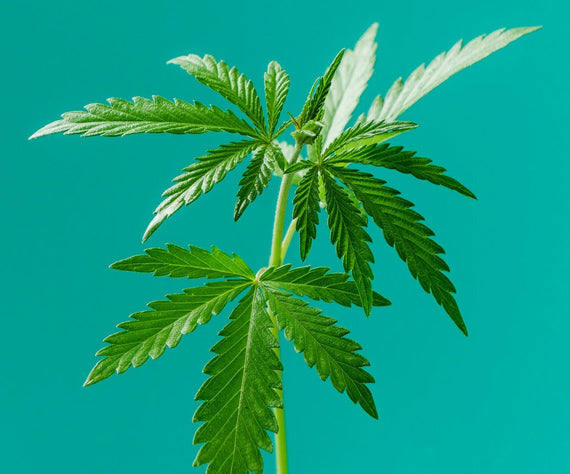

Table of Contents
You're probably already familiar with CBD. It’s no longer just a buzzword floating around in wellness circles—it’s a staple in many people's routines seeking natural alternatives for managing stress, discomfort, or sleepless nights. But if you’ve been paying attention to CBD labels, you’ve likely noticed some terms popping up again and again: CBD isolate and full-spectrum CBD.
Even if you’ve been using CBD for a while, understanding the differences between these two can be key to refining your experience. Think of this as taking the next step in your CBD journey—moving beyond the surface-level basics and figuring out how to optimize your wellness routine with the right product for your specific needs.
You’re here because you want clarity. Maybe you’re trying to decide which one will give you the most bang for your buck, or maybe you’re just wondering if full-spectrum’s entourage effect is worth the tiny trace of THC. Whatever your reason, you’re in the right place. Let’s break down the differences in a way that makes sense and helps you feel confident about your CBD choices moving forward.
What Exactly Is CBD?
CBD, short for cannabidiol, is one of over 100 naturally occurring compounds known as cannabinoids that are found in the cannabis plant. Unlike its more famous cousin, THC (tetrahydrocannabinol), CBD won’t get you high. That’s because CBD interacts with the body’s endocannabinoid system in a way that promotes balance without creating psychoactive effects. This is one of the reasons CBD has garnered attention as a more approachable wellness option for people looking to relieve pain, reduce anxiety, or improve sleep, all without the mind-altering effects associated with THC.
CBD is primarily extracted from hemp, a variety of the cannabis plant that contains less than 0.3% THC by law. This low THC content makes hemp-derived CBD products federally legal in many places, and it’s why you see CBD products popping up everywhere—from oils and tinctures to gummies and topical creams. While marijuana plants also contain CBD, hemp is favored for its low THC levels, making it the ideal source for CBD products intended for widespread use without the legal complications of THC.
CBD works by interacting with the body's endocannabinoid system (ECS), a network of receptors that helps regulate many vital functions such as mood, pain response, immune function, and sleep. The ECS produces its own cannabinoids, but when it’s out of balance, supplements like CBD can help support the system by mimicking these natural compounds. This is why CBD has been embraced not only for general wellness but also for more targeted uses like pain management, anxiety reduction, and sleep support.
What Is CBD Isolate?
Let’s start with the purist option: CBD isolate. As the name suggests, CBD isolate is pure CBD—nothing more, nothing less. Through a refining process, all other cannabinoids, terpenes, and plant compounds are removed, leaving only CBD in its most concentrated form.
CBD isolate is often found in products like tinctures, capsules, and powders, and it’s the ideal choice for anyone who wants to avoid THC altogether. If you’re worried about drug testing or are particularly sensitive to other cannabinoids, CBD isolate could be the perfect match for you.
The Pros of CBD Isolate
- Pure CBD: It’s 99% CBD, with no trace of THC, which means no psychoactive effects or risk of THC showing up in a drug test.
- Customizable Dosing: Because it’s pure, it’s easier to control exactly how much CBD you’re getting.
- Versatile: It can be added to food, drinks, or used in skincare products.
The Cons of CBD Isolate
- No Entourage Effect: CBD isolate lacks the other beneficial cannabinoids and compounds found in hemp, meaning it doesn’t produce the entourage effect (more on that in a minute).
- Limited Benefits: Some studies suggest that without the other compounds, CBD isolate may not be as effective as full-spectrum CBD for certain conditions.
What Is Full Spectrum CBD?
Now, let’s talk about full-spectrum CBD, which is essentially the opposite of CBD isolate. Full-spectrum CBD contains not only CBD but all other cannabinoids, terpenes, flavonoids, and essential oils that occur naturally in the hemp plant—including trace amounts of THC.
But don’t worry! By law, hemp-derived CBD products must contain less than 0.3% THC, which isn’t enough to get you high. However, that tiny bit of THC, along with the other compounds, helps create what’s called the entourage effect.
The Entourage Effect
This is where full-spectrum CBD really shines. The entourage effect is the idea that all the cannabinoids and terpenes in the hemp plant work together synergistically, enhancing each other’s effects. In other words, when you use full-spectrum CBD, you’re getting a more holistic experience—one that could potentially deliver more therapeutic benefits than CBD isolate alone.

The Pros of Full Spectrum CBD
- Entourage Effect: The combination of cannabinoids and terpenes may boost CBD’s overall effectiveness.
- Natural and Less Processed: Full-spectrum products undergo less processing than isolates, meaning they retain more of the plant’s natural compounds.
- Broad Therapeutic Benefits: It’s believed to be more effective for conditions like chronic pain, anxiety, and inflammation.
The Cons of Full Spectrum CBD
- Trace THC: While the amount of THC is minimal, it may still show up on a drug test, especially if you use full-spectrum products regularly.
- Taste: Full-spectrum CBD tends to have a stronger, earthier flavor due to the presence of additional terpenes and cannabinoids.
Broad Spectrum CBD
Broad-spectrum CBD is similar to Full-Spectrum CBD. It indicates that there are fewer terpenes, flavonoids, and cannabinoids than true Full-Spectrum CBD. However, unlike isolate, it still contains some of those terpenes, flavonoids, and cannabinoids.
The biggest consideration is that broad-spectrum CBD can have absolutely no THC content, while full-spectrum CBD can have a tiny percentage of THC still included.
Full Spectrum vs. CBD Isolate: Which One Is Right for You?

Now that you’ve got a solid understanding of the differences between CBD isolate and full-spectrum CBD, the big question is: Which one should you choose? The answer depends on your goals, preferences, and how you want CBD to fit into your lifestyle.
Let’s break it down further based on a few key considerations:
Are You Concerned About THC?
If you’re looking to avoid THC entirely—whether it’s due to workplace drug tests, legal concerns, or personal preference—CBD isolate is your safest bet. Since it’s pure cannabidiol without any trace of THC, you won’t have to worry about any psychoactive effects or running the risk of a positive drug test. This is one of the main reasons why people opt for isolates, especially in regions with strict regulations around THC.
Do You Want Maximum Benefits?
If you’re after the full range of benefits that CBD can offer, full-spectrum CBD is likely the better choice. Thanks to the entourage effect, full-spectrum CBD products deliver a synergy of cannabinoids, terpenes, and other plant compounds that can amplify the therapeutic effects. This makes it ideal for managing conditions like chronic pain, anxiety, inflammation, and even sleep disorders. Full-spectrum CBD takes advantage of the complete profile of the hemp plant to provide more comprehensive relief.
Are You New to CBD?
If you’re just starting your CBD journey, you might be wondering whether to dip your toes in with an isolate or go all in with full-spectrum. For beginners, full-spectrum or broad-spectrum products can offer a more rounded experience, allowing you to explore the complete effects of CBD. However, if you’re cautious about THC or want a more controlled, gradual introduction, CBD isolate can help you ease into it without the complexity of other cannabinoids.
Beyond the basics, there are a few more things you should consider when deciding between full-spectrum and CBD isolate.
Your Health Goals
If you’re using CBD for a specific condition, such as chronic pain or anxiety, you might find that full-spectrum CBD is more effective. Studies suggest that the entourage effect—where cannabinoids like CBD, CBG, and even trace amounts of THC work together—could provide more pronounced relief compared to CBD isolate. On the other hand, if your goal is to use CBD more for everyday wellness or mild relief, an isolate might be perfectly sufficient.
Sensitivity to Other Cannabinoids
Some people are more sensitive to THC, even in tiny amounts. If you know you’re sensitive to THC or other cannabinoids, you might want to stick with CBD isolate to avoid any unwanted side effects, such as drowsiness or mild psychoactive feelings.
Product Availability and Preference
Different forms of CBD might appeal to you depending on your lifestyle. Full-spectrum products, because they contain a broader range of cannabinoids, tend to have a stronger, earthier taste. If flavor matters to you, CBD isolate—which is odorless and tasteless—could be a better option, especially in products like gummies or capsules.
Scientific Backing: What Does the Research Say?

The research supporting CBD’s potential, particularly full-spectrum CBD, continues to grow as scientists dive deeper into its effects. One key factor that makes full-spectrum CBD so promising is the entourage effect—a term used to describe how various cannabinoids and terpenes work together to enhance therapeutic outcomes.
This synergy means that when you consume full-spectrum CBD, you're not just benefiting from cannabidiol alone but from the combined effects of all the natural compounds found in the hemp plant. This collaborative action is thought to be the reason full-spectrum CBD often outperforms CBD isolate in studies focused on conditions like inflammation and pain.
In addition to the 2015 study from the Hebrew University of Jerusalem, other research has explored full-spectrum CBD’s impact on conditions beyond inflammation. A study published in Pharmacology & Pharmacy in 2011 found that full-spectrum CBD was more effective at providing pain relief compared to CBD isolate. The full-spectrum product was also shown to be more effective over time, meaning users didn’t have to continually increase their dosage to experience the same benefits.
This suggests that the entourage effect plays a significant role in the long-term efficacy of CBD for chronic conditions like pain management.
Moreover, ongoing research continues to explore how full-spectrum CBD could help with a range of neurological conditions. For instance, the Frontiers in Neurology study from 2019 not only highlighted CBD’s potential in managing epilepsy but pointed to its broader neuroprotective effects. These findings are leading to more clinical trials aimed at understanding how full-spectrum CBD could be leveraged in treatments for conditions like multiple sclerosis, Alzheimer’s, and Parkinson’s disease.
While more data is needed, the current scientific backing paints a hopeful picture for the future of full-spectrum CBD in both everyday wellness and targeted therapies.
How to Choose the Right CBD Product for You
There’s no “one-size-fits-all” answer when it comes to CBD, so choosing between isolate and full-spectrum CBD depends on your unique needs and lifestyle. Here are some quick tips to help you decide:
- If you want to avoid THC completely: CBD isolate is the safest bet.
- If you’re seeking enhanced benefits for conditions like chronic pain, anxiety, or sleep issues: Full-spectrum might be the better choice.
- If you’re new to CBD: Start with a lower dose of either isolate or full-spectrum and see how your body responds before adjusting.
What Products Are Available?
You’ll find both CBD isolate and full-spectrum CBD in a variety of products, including:
- Oils and Tinctures: One of the most common and versatile ways to take CBD, oils and tinctures allow you to adjust your dosage easily.
- Capsules and Softgels: These offer a pre-measured dose of CBD, making it easy to take on the go.
- Gummies and Edibles: A tasty way to get your CBD fix, though it may take longer for the effects to kick in since they need to be digested.
- Topicals: Lotions, balms, and creams infused with CBD can be applied directly to the skin for localized relief.
If you’re looking for high-quality CBD products that fulfill these categories, we offer a range of solutions tailored to your needs. Montkush is known for our USDA Organic Full-Spectrum CBD Oil, which is pressed directly from hemp flower using a clean, solventless method.
This oil delivers the full benefits of the plant’s cannabinoids, terpenes, and other compounds, making it a top choice for those looking to experience the entourage effect.
Final Thoughts: CBD Isolate vs. Full Spectrum CBD—Which One Wins?
Ultimately, the decision between CBD isolate and full-spectrum comes down to what works best for you. If you're someone who prefers to take a cautious approach and wants absolute control over your CBD intake without worrying about THC, CBD isolate is a fantastic option. It's clean, simple, and effective for those looking for pure CBD benefits.
However, if you want to experience the entourage effect and get the most out of your CBD experience, full-spectrum is the way to go. Whether you’re managing a specific condition or seeking the overall wellness benefits that come from a more holistic product, full-spectrum CBD is likely to deliver a more powerful impact.
At the end of the day, there’s no one-size-fits-all answer. You may need to experiment with both types of products to find the one that best fits your needs and lifestyle. Each person’s body chemistry is unique, and what works for one person may not work the same for another. So take your time, try different products, and listen to your body. After all, your CBD journey is just that—yours.


